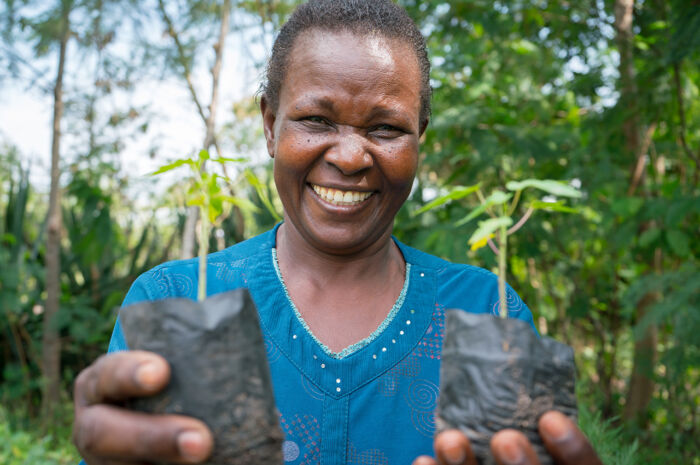Empowering farmers through sustainable agriculture
In this project, farmers gain valuable knowledge about sustainable agriculture land management (SALM). They then apply these practices on their own farms, leading to higher crop yields, which in turn boosts family incomes.
Improving resilience and combating climate change
The benefits go beyond larger harvests. These sustainable practices improve the soil’s ability to retain water and protect nutrient-rich soil from erosion. This helps farms better withstand the effects of climate change, such as droughts and heavy rainfall. Additionally, by storing more carbon in the soil than conventional farming methods, these practices also contribute to reducing greenhouse gas emissions.
Carbon credits: a bonus for farmers
Farmers who adopt these methods help capture carbon dioxide in both trees and the soil, through sustainable techniques like agroforestry (growing trees alongside crops), cover crops, and compost. The carbon captured is converted into carbon credits — each tonne of carbon dioxide equivalent equals one carbon credit. These carbon credits are sold to companies and individuals, and the income goes to the participating farmers.
Social, environmental, and financial benefits
However, the real value for the farmers is the improved productivity of their farms. Higher yields mean more food on the table and extra income from selling surplus crops. This project not only brings environmental benefits, but also supports the financial and social well-being of tens of thousands of families living around Lake Victoria.

Project scope and history
The project spans around 22,000 hectares in Kenya’s Nyanza and Western Provinces, near the cities of Kisumu and Kitale. Launched in partnership with the World Bank’s BioCarbon Fund in 2009, it was the first project in Africa to store carbon dioxide in both trees and soil. It also pioneered a model where smallholder farmers are compensated for the environmental services they provide through sustainable farming.
A globally recognized methodology
Vi Agroforestry, in collaboration with the World Bank’s BioCarbon Fund and UNIQUE forestry and land use, developed the project’s methodology, known as VM0017 Sustainable Agricultural Land Management. This approach, tailored for smallholder farmers, aims to build resilience to climate change, enhance food security through better farm productivity, increase farmers’ incomes, and reduce greenhouse gas emissions from agriculture. The methodology is certified by Verra’s Verified Carbon Standard (VCS) and is globally recognized.
Monitoring and verification
To ensure transparency and effectiveness, the project is verified by an independent third party every two to three years. Annual follow-ups also monitor various aspects, such as pest control, farmers’ livelihoods, and the activities carried out on their farms.
For the year 2024, looking at climate adaptation and sustainable agriculture, 8,865 farmers were trained in methods such as composting, water conservation, and pest management. This resulted in 4,234 hectares of land being cultivated sustainably and 229,702 trees being planted. To improve livelihoods, 367 farmers received training in poultry farming, and 2,500 farmers gained access to starter seeds. Additionally, 413 farmers were trained in tomato cultivation and 257 in banana cultivation, with 290 establishing composting practices. Savings and loan systems were introduced in 82 farmer groups during 2024.
Project name: Kenya Agricultural Carbon Project (KACP)
Brief context: Smallholder farmers in Kenya face challenges such as low crop yields, poor soil health, and vulnerability to climate change.
Main purpose: Empower smallholder farmer families with Sustainable Agriculture Land Management (SALM) practices to improve crop yields, increase incomes, and reduce greenhouse gas emissions through carbon credits.
Duration: 2009 – Ongoing.
Location: Nyanza and Western Provinces, near Kisumu and Kitale, Kenya.
Target group: 30,000 smallholder farmers.
Donors: Income from carbon credits sold to companies and individuals in Sweden.
Partner: World Bank’s BioCarbon Fund and UNIQUE forestry and land use.
Standard and certification: The methodology, VM0017 Sustainable Agricultural Land Management, is certified by Verra’s Verified Carbon Standard (VCS).

